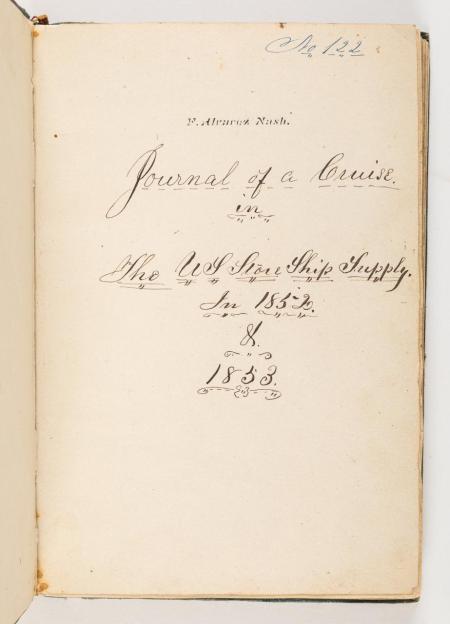
This set of diaries covers important events throughout the middle of the nineteenth century, including Commodore Matthew C. Perry's (1794-1858) Black Ships Cruise to Japan in order to open trade via gunboat diplomacy, abolitionism, national politics of the 1850s and 1860s, the presidential election of 1860, and the Civil War. Nash also references masonry and the development in Abington of Unitarian Universalism.
Nash's adventures began in 1852 when he joined the United States Navy and was assigned to the "supply," a ship of naval stores. He wrote of his life on board, his reading material, national and international issues, interactions with foreign ships, and the painting black of all the ships in the squadron. He criticized the "slackness" of American projects and expeditions and also described life in China and his dedication to Universalism. Nash commented on the secrecy of the Perry expedition, preparations, and concern that bloodshed would occur when Japan was confronted. When Commodore Perry's cruise left Loo Choo Island for Japan, the "supply" was left behind, but Nash reported in his diary of Perry's doings and life on Loo Choo Island, where Nash hired a concubine for a night.
While on Loo Choo Nash referred several times to seeing the helpful British missionary, Bernard J. Bettelheim (1811-1870), as well as to the Treaty of Amity and Friendship. He critiqued the Japanese people, and wrote a lengthy description of the landing of Perry's marines on Shimoda and the visit to the ships of Japanese princes and mandarins. Nash frequently transcribed poetry in his diaries.
In 1857 Nash was home, married, and working as a sales clerk. Abington, and especially Island Grove Park) was a hotbed of abolitionism, and Nash attended lectures by William Lloyd Garrison, Wendell Phillips, Abby Kelley Foster, Edward Everett, and Henry Ward Beecher. Nash also referred often to his commitment to Universalism and its local church. His interest in national politics is clearly reflected in his diaries (e.g., criticisms of President Buchanan and arguments in Congress over Bleeding Kansas). Nash also gave lectures in Abington on the Black Ships Cruise.
In 1860 Nash frequently wrote about the presidential election. He was a devout Republican and joined the Wide-Awakes, a group of political activists, and marched in their parades and participated in their demonstrations. When the Civil War began Nash joined the United States Coast Guard and shipped out on the "Pembroke" to deliver supplies to Massachusetts troops. He then joined the Navy, which had better pay, in May 1861 and served as Master at Arms on the "Vincennes," part of the blockading squadron. The ship traveled to the Bahamas and Key West, while Nash continued to report on land battles and to describe all that he saw. At one point, the "Vincennes" stopped a French ship and searched for a French consul.
In May 1864 Nash joined the 38th Massachusetts Infantry, Company C, as a First Lieutenant. He later served as First Lieutenant in Battery K, Third Massachusetts Artillery, in Fort Stevens, Washington. He participated in the attack on and siege of Port Hudson, Louisiana, in June. He described social mingling with Confederate soldiers and socializing with Pro-Union families in New Orleans and Baton Rouge. He also described illnesses among the troops and the capture of by African-American troops of the Confederate food supply, eventually contributing to the surrender of Port Hudson.
Nash referenced the hiring of former slaves as servants to the officers, the death due to disease of his brother Edward, also a soldier, the attitudes of southerners to his presence, and all the war news that reached him. He reflected on the presidential election returns in 1864 and the details of Lincoln's assassination, the hunt for the assassins, the funeral, and Nash's conviction that Jefferson Davis was involved in the president's murder. In May 1865 he attended the Grand Review of the Union Armies in Washington, after which he criticized Sherman's troops.